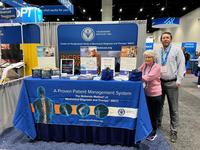News Room
Listening and Dedication to the Craft Lead to Clinical Excellence
How do you measure clinical excellence?
"The person sitting in front of you probably knows more about their condition than anyone else," says Todd Edelson, PT, DPT, Dip. MDT. "So, it makes sense to listen to him or her."
That's a very valuable lesson he picked up from McKenzie Method® of Mechanical Diagnosis and Therapy® (MDT) Founder Robin McKenzie, who said: "Everything I learned, I learned from my patients."
It adds to the skills he developed early in his career while working as a physical therapist in two New Jersey hospitals, where he developed collegial relationships with the medical, nursing, radiology and other staffs in addition to treating a broad range of in- and out-patients.
“Physicians took my clinical questions and invited me to observe surgeries and attend rounds with them," Edelson says. “In doing so, I developed diverse clinical experience and pattern recognition skills."
This set of skills became a cornerstone for Montclair Physical Therapy, Edelson's certified McKenzie clinics in New York City and New Jersey.
"When someone comes into my practice for the first time, the first thing I tell them is it's not about me," Edelson says.
MDT's patient-centered approach backs that up with the primary goal of education and self-treatment.
The evidence-based MDT system begins with a thorough mechanical evaluation to establish a "cause-and-effect" relationship between historical pain behavior as well as the response to repeated test movements, positions and activities.
A systematic progression of applied mechanical forces utilizes pain response to monitor changes in motion and function to classify the disorder. Clinicians then develop a treatment program that empowers patients to treat themselves when possible.
That involves a lot of listening, which in turn leads to clinical excellence, Edelson says.
Becoming an excellent clinician means taking that clinical excellence, which is largely focused on self and successfully delivering those skills in patient and organizational contexts.
“I see internal drive and clearly defined goals as most important for practice owners striving for clinical excellence," Edelson says. "If you’re going to have a staff, solid leadership skills that enable you to bring others along on your journey are just as essential."
Excellent clinicians apply education and experience to recognize patterns and become experts at deductive reasoning, says Edelson, who also has a history in the hard sciences.
"Separate from physical therapy degrees, my bachelor’s and master's degrees are in the biological sciences and included years of lab work and research. Understanding and using hypothetico-deductive reasoning is second nature for me and set me up well to learn, deliver and teach the McKenzie Method, which relies on the scientific method," Edelson says. "Years of chemistry, physics and biology allow me to understand and communicate to others the science behind their pain and recovery, and inform sound clinical decision making."
Being an excellent clinician all comes down to how you handle every first patient visit.
"I'm going to ask you a lot of questions," Edelson tells his patients. "I'm here to listen to you to find the answers."
Share your news! Send your story to us and we'll post it for everyone to read.




